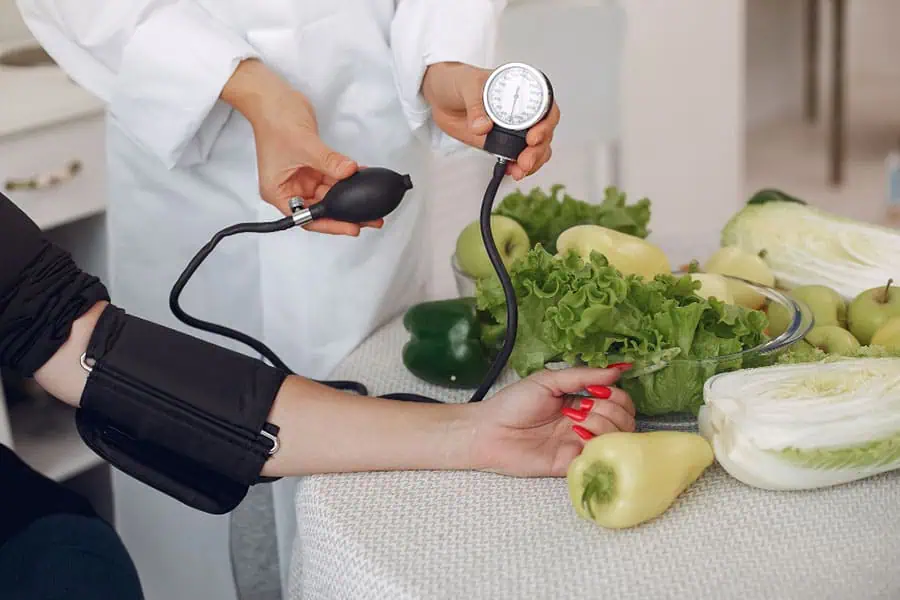High Blood Pressure (Hypertension) – Causes, Risks & Prevention

In Miami Lakes, FL, hypertension—or high blood pressure—is a widespread but serious condition that often has no symptoms, earning it the nickname “silent killer.” Left untreated, it increases the risk of heart disease, stroke, and kidney failure. Many individuals remain unaware they have high blood pressure until they experience complications involving the circulatory system.
April is National Minority Health Month, a time to raise awareness about health disparities and the importance of preventive care. The good news? Hypertension is manageable with early detection, lifestyle changes, and medical support. If you're in the Miami Lakes area, schedule a screening with All-Inclusive Preventive Care today!
What is Hypertension? Understanding Blood Pressure Levels
Blood pressure is the force (pressure) of circulating blood pushing against the walls of the arteries, which are the blood vessels that carry oxygen-rich blood from the heart to the rest of the body. When blood pushes too hard for too long, it wears out artery walls and makes the heart work harder. This is called hypertension.
Blood pressure is measured using two numbers:
- Systolic pressure (top number): The pressure in your arteries when the heart beats.
- Diastolic pressure (bottom number): The pressure in your arteries when the heart is resting between beats.
Blood Pressure Categories:
- Normal: Below 120/80 mmHg*
- Elevated: 120-129/<80 mmHg
- Hypertension Stage 1: 130-139/80-89 mmHg
- Hypertension Stage 2: 140+/90+ mmHg
- Hypertensive Crisis: Higher than 180/120 mmHg (medical emergency)
* mmHg stands for millimeters of mercury, a unit used to measure arterial pressure.
Uncontrolled hypertension puts stress on the circulatory system, damaging blood vessels and organs over time. This can lead to serious health issues such as heart attack (myocardial infarction), heart failure, stroke, and chronic kidney disease.
According to the American Heart Association, long-term high blood pressure can also harm the brain, increasing the risk of dementia, memory loss, or a transient ischemic attack (TIA)—sometimes called a “mini-stroke.”
Blood pressure should be checked regularly using a sphygmomanometer, more commonly known as a blood pressure cuff—a medical device with an inflatable cuff placed around the arm to measure the pressure of blood in the arteries. In some cases, an ambulatory blood pressure monitor may be recommended to measure blood pressure at regular intervals throughout the day and night during normal activities.

Common Causes & Risk Factors of Hypertension
Hypertension can be classified into two categories:
- Essential Hypertension (Primary): This type has no identifiable cause but is often linked to genetics, aging, and lifestyle choices.
- Secondary Hypertension: Caused by an underlying health condition, such as kidney disease, hormonal disorders (like primary aldosteronism), or side effects of certain medications, including birth control or decongestants.
Key Contributing Risk Factors
- Unhealthy Diet: A diet high in sodium (salt), low in potassium, and rich in saturated fat and added sugars can raise blood pressure. Sodium causes the body to retain water, increasing blood volume, while low potassium disrupts the balance needed to relax artery walls.
- Physical Inactivity: A sedentary lifestyle, which involves little or no physical activity, reduces how efficiently the heart pumps blood (cardiac output) and raises resistance in the circulatory system, leading to increased blood pressure.
- Obesity & High Cholesterol: Excess weight raises pressure on the heart and arteries. A high body mass index (BMI) is closely linked to elevated blood pressure and metabolic syndrome.
- Chronic Stress & Sleep Deprivation: These disrupt hormone regulation, increase sympathetic nervous system activity, and raise pressure.
- Smoking & Alcohol Use: Tobacco smoking and excessive alcohol consumption damage the artery walls, increase stiffness, and raise blood pressure. These habits also lower oxygen in the blood and raise the risk of atherosclerosis, or artery narrowing.
- Genetics & Aging: Family history and older age are strong risk factors due to changes in artery elasticity and hormone regulation.
- Other Health Conditions: Chronic illnesses like hyperthyroidism, type 2 diabetes, adrenal gland disorders, or chronic kidney disease can interfere with hormone or fluid regulation, increasing blood pressure or leading to secondary hypertension.
Learn more by checking out our guide to medical weight loss.
Why Black and Hispanic Communities Face Higher Risks
Black and Hispanic individuals may face higher rates of hypertension due to a mix of genetic, environmental, and social factors.
- Genetics play a role, as some individuals have higher salt sensitivity, which can cause blood pressure to rise more quickly.
- Social determinants of health, like access to quality health care, healthy food, and opportunities for physical activity, contribute significantly.
- Cultural dietary habits that include high sodium and processed foods increase the risk.
- Mistrust in the healthcare system may lead to screenings and hypertension management delays.
The Health Risks of Uncontrolled Hypertension
High blood pressure can silently damage the circulatory system and organs before any symptoms appear. Without proper management of hypertension, the risk of life-threatening conditions increases, including:
- Heart Disease: Ongoing hypertension forces the heart to pump against higher arterial pressure, causing the heart muscle to thicken (left ventricular hypertrophy). This can lead to angina (chest pain from low oxygen), palpitations, and eventually heart failure. For more, read our signs and symptoms of heart disease guide.
- Stroke: Elevated blood pressure can weaken or rupture arteries in the brain, causing a hemorrhagic stroke, or block blood flow entirely, resulting in an ischemic stroke or a transient ischemic attack (TIA)—a warning sign of future strokes.
- Diabetes Complications: Uncontrolled hypertension worsens insulin resistance and raises the likelihood of developing metabolic syndrome, a cluster of conditions that increase the risk for type 2 diabetes, heart disease, and stroke. Learn more in our Type 1 vs. Type 2 diabetes guide.
- Kidney Disease: High blood pressure can narrow or scar kidney arteries, reducing the kidneys' ability to filter waste and regulate fluid. Over time, this may cause chronic kidney disease, swelling (edema), or kidney failure.
- Pregnancy Complications: Conditions like gestational hypertension or preeclampsia (high blood pressure during pregnancy with signs of organ stress) can cause serious complications, including low birth weight, premature delivery, and organ damage in both the mother and baby. Learn more in our blog on gynecological care.

How to Prevent & Manage Hypertension
Hypertension is a major health concern, but the good news is that it can often be prevented or controlled with lifestyle changes and proper medical care. By understanding risk factors and taking action—such as improving nutrition, increasing physical activity, and managing stress—people can lower their blood pressure and protect their circulatory system and heart health. Here’s what you need to know about effective prevention and management strategies.
Healthy Lifestyle Changes for Everyone
- Healthy Diet: Follow the DASH diet (Dietary Approaches to Stop Hypertension), which is rich in whole grains, fruits, vegetables, low-fat dairy, and low in sodium (salt). Limit saturated fat, added sugar, and caffeine from drinks like coffee. Include foods high in potassium, magnesium, and calcium, which help relax artery walls and support heart health. For more guidance, read our 5 pillars of building a healthy lifestyle.
- Exercise: Aim for at least 150 minutes of moderate physical activity each week, such as walking, swimming, or biking. Both aerobic exercise and strength training help reduce blood pressure by improving cardiac output, circulation, and metabolism—especially helpful for people with metabolic syndrome or high body mass index (BMI). Looking for fitness support? Check out our top-rated Miami Lakes gyms.
- Manage Stress: Long-term stress can trigger hormone changes that raise blood pressure. Managing stress through meditation, therapy, deep breathing, or better sleep can improve heart health and support the management of hypertension.
- Limit Alcohol & Quit Smoking: Drinking too much alcohol and tobacco smoking both raise blood pressure by damaging artery walls and increasing vascular resistance. Smoking also reduces oxygen in the blood and speeds up atherosclerosis, the hardening and narrowing of arteries.
Don’t Skip Your Health Check-Ups
- Annual Physical Examination: Regular check-ups allow for accurate blood pressure measurement using a sphygmomanometer, and early detection of conditions like white coat hypertension—a temporary increase in blood pressure during a medical visit. These visits also provide an opportunity to discuss possible high BP symptoms such as dizziness, fatigue, headaches, palpitations, nosebleeds, nausea, or shortness of breath.
- Partner with a Health Professional: A trusted health care provider can monitor your blood pressure regularly, identify risk factors like obesity, poor sleep, or high cholesterol, and manage side effects from medications. They can also recommend weight loss, dietary changes, or refer you to a pharmacy for blood pressure medicine management.
- Preventive Screenings & Diagnostic Testing: Screenings may include blood tests to check for chronic kidney disease, blood sugar levels, and cholesterol. Ambulatory blood pressure monitoring can capture readings throughout the day to help identify causes of secondary hypertension, especially in people with underlying conditions like adrenal gland disorders or primary aldosteronism.
When Medication is Needed
Some patients may require medication to control their blood pressure, especially if lifestyle changes aren't enough or if they are at high risk for events like stroke or heart failure. These drugs help reduce pressure in the circulatory system, protect organs like the brain, kidneys, and lungs, and prevent long-term complications such as hypertensive emergencies.
Common classes of antihypertensive medications include:
- Thiazide Diuretics: Help the kidneys remove excess fluid and sodium (salt), lowering blood volume and blood pressure.
- Beta Blockers: Reduce heart rate and how hard the heart pumps, easing pressure on the arteries.
- Calcium Channel Blockers: Relax the muscles around blood vessels and may slow the heart rate.
- Angiotensin II Receptor Blockers (ARBs): Prevent angiotensin, a hormone that narrows arteries, from binding to its receptors—allowing blood vessels to stay open and lower pressure.
Depending on the patient's condition, a healthcare provider may recommend combination therapy—using more than one blood pressure medicine. This approach is based on age, body mass index, medical history, potential side effects, and coexisting conditions like type 2 diabetes, ulcerative colitis, or chronic kidney disease.
Working with a trusted physician is essential for proper management of hypertension. Regular follow-ups help track blood pressure trends, adjust dosages, and monitor for side effects like nausea, cough, vomiting, or edema (swelling). Stopping medication suddenly can lead to rebound hypertension or a hypertensive emergency, which may require urgent care.
Need a check-up? Learn about our annual physical exams for adults in Miami.
How All-Inclusive Preventive Care Supports Hypertension Management
Managing hypertension requires a proactive, whole-body approach. At All-Inclusive Preventive Care, we provide tools for effective hypertension self care, including regular blood pressure monitoring, nutrition counseling, and tailored treatment plans. Whether you use a bp cuff at home or a Respiratory device (a non-drug tool to lower blood pressure through breathing exercises), we help you take charge of your cardiovascular health and reduce long-term risks.
Comprehensive Heart Health & Blood Pressure Management
Our expert-led services support a holistic approach to blood pressure management and heart health. From advanced pressure measurement tools to whole grain-based meal plans and physical activity coaching, we offer science-backed strategies that help patients achieve lasting results.
Our services include:
- Advanced Blood Pressure Monitoring & Screenings – Detect hypertension early with regular monitoring.
- Personalized Nutrition Counseling – Create a heart-healthy meal plan tailored to your dietary needs.
- Medical Weight Loss Programs – Achieve and maintain a healthy weight to lower hypertension risk.
- Lifestyle Coaching for Stress & Mental Health – Manage stress effectively to improve overall well-being.
- Cardiology Referrals & Support – Access expert cardiology care for advanced hypertension management.
Why Culturally Competent Care Matters
At All-Inclusive Preventive Care, we recognize that hypertension does not affect all communities in the same way. Effective management of hypertension goes beyond medication—it requires understanding how culture, trust, and access to health care influence diagnosis, treatment, and outcomes.
Historically, African American and Hispanic communities have experienced disparities in care due to systemic bias within medical settings. These disparities can lead to:
- Underdiagnosis of symptoms such as hypertension headaches, chest pain, or shortness of breath
- Delayed or inappropriate treatment using antihypertensive drugs like diuretics or calcium channel blockers
- Missed screenings for secondary hypertension, chronic kidney disease, or pregnancy-related conditions like preeclampsia
- Dismissal of reported symptoms like palpitations, fatigue, dizziness, nausea, or nosebleeds
Bias may also affect how clinicians interpret risk factors such as obesity, sleep deprivation, or a family history of high blood pressure. That’s why partnering with a culturally competent provider—one who listens, respects cultural differences, and explains medical information clearly—is essential for delivering effective care.
At All-Inclusive Preventive Care, our team:
- Builds trust through open, respectful communication
- Honors cultural preferences in areas like nutrition, physical activity, and medicine
- Follows proven guidelines from the American Heart Association, World Health Organization, and Centers for Disease Control and Prevention
- Offers personalized education on lifestyle changes, medication adherence, and home monitoring with tools like a sphygmomanometer, bp cuff, or ambulatory blood pressure monitor
We also recognize and address specific risks within marginalized communities, including gestational hypertension, essential hypertension, and complications from chronic kidney disease or low birth weight.
The result? Earlier diagnoses, better adherence to treatment, and fewer complications such as stroke, heart failure, or end organ damage.
Culturally competent care isn’t just ethical—it’s life-saving.
Prioritize Your Heart Health Today
Your heart health is too important to ignore. Hypertension is a silent but serious condition, and taking proactive steps today can make all the difference in your long-term well-being. At All-Inclusive Preventive Care, we are committed to providing expert care and support to help you maintain healthy blood pressure and overall heart health.
Don’t wait until it’s too late—schedule your blood pressure screening today and take control of your health. Whether you need lifestyle guidance, medical intervention, or ongoing support, our team is here to help every step of the way.
📍 Visit us at All-Inclusive Preventive Care in Miami Lakes, FL. 📞 Call us at (305) 200-3141 to book an appointment.
